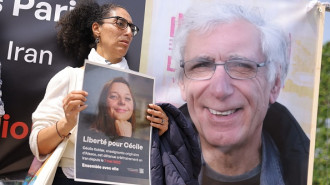Saudi Arabia 'backs down from blocking UN climate report'
Oil giant Saudi Arabia backed down at the last minute Saturday from obstructing the adoption of a major report by the UN's climate science panel, sources told AFP.
With the threat removed, the meeting of the 195-nation panel in Incheon, South Korea - deep into overtime - swiftly approved the report on how to cap global warming at 1.5 degrees Celsius (2.7 degrees Fahrenheit), and what a 1.5C world might look like.
The Saudis had objected to the inclusion of a passage emphasising the need for sharp reductions in the use of fossil fuels - Saudi Arabia's main export.
"Saudi Arabia withdrew its blockage of the passage when their objection was about to be formally recorded in a footnote," said a participant in the meeting.
"It was a game of chicken, and the Saudi's blinked first."
The 500-page report - based on 6,000 peer reviewed studies - under review at the meeting of the Intergovernmental Panel on Climate Change (IPCC) is a collaborative effort of the world's top climate scientists.
Under the IPCC's consensus rules, all countries must sign off on the language of a 20-page Summary for Policymakers, designed to provide leaders with objective, science-based information.
After six hours of fruitless negotiations Saturday morning, the chair of the IPPC meeting adjourned the plenary around midday, warning: "The report hangs in the balance."
A break-out group - or "huddle," in UN jargon - made no progress in resolving the deadlock.
Finally, when the plenary resumed, the Saudis' withdrew their objection just before their demand was to be rejected and noted in the record.
"We expected tough negotiations on this landmark report and we are happy that governments have delivered a good reflection of the underlying science," said Stephen Cornelius, WWF's chief advisor on climate change and a former IPCC negotiator.
"Current country pledges to cut emissions are insufficient to limit global warming to 1.5°C - you can’t negotiate with science."
- 'Running interference' -
At issue was a passage in the summary stating that voluntary national commitments to reduce greenhouse gas emissions, annexed to the 2015 Paris climate treaty, will fail to limit warming to 1.5C.
Current pledges would at best yield a 3C world by century's end, far above the 2C cap mandated by the Paris Agreement.
These so-called "nationally determined contributions" run from 2020 to 2030 for most countries, including Saudi Arabia, and to 2025 for a few others.
The passage goes on to note that capping global warming under 1.5C "can only be achieved if global CO2 emissions start to decline well before 2030".
As a consequence, scientists and climate activists have called on countries to ratchet up their carbon-cutting pledges as soon as possible.
In the case of an impasse, the chairs of an IPCC meeting can override an objection from one or a few countries, recording it in a footnote.
"It's quite rare that a government will be willing to have their name on the bottom of the page with an asterisk," Jonathan Lynn, head of communications for the IPCC, said last week.
"We do everything we can to avoid it."
Saudi Arabia has a long track record of raising questions and objections within UN climate forums.
During the week-long talks in Incheon, "the Saudis have been running interference across the board, on main and minor issues," a participant in the meeting said.





 Follow the Middle East's top stories in English at The New Arab on Google News
Follow the Middle East's top stories in English at The New Arab on Google News

![The law could be enforced against teachers without prior notice [Getty]](/sites/default/files/styles/image_330x185/public/2178740715.jpeg?h=a5f2f23a&itok=xMdFOAIF)
